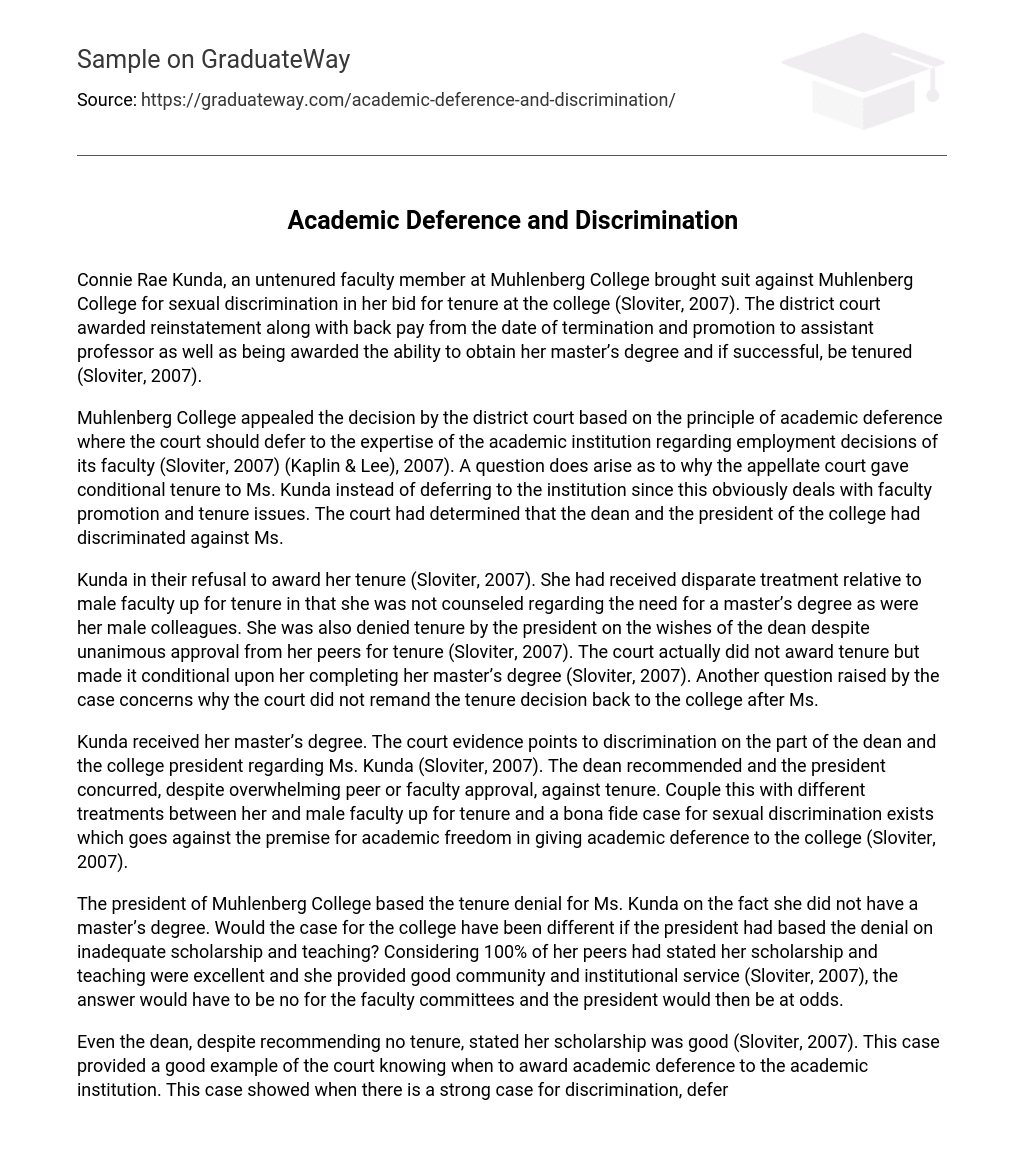Connie Rae Kunda, an untenured faculty member at Muhlenberg College brought suit against Muhlenberg College for sexual discrimination in her bid for tenure at the college (Sloviter, 2007). The district court awarded reinstatement along with back pay from the date of termination and promotion to assistant professor as well as being awarded the ability to obtain her master’s degree and if successful, be tenured (Sloviter, 2007).
Muhlenberg College appealed the decision by the district court based on the principle of academic deference where the court should defer to the expertise of the academic institution regarding employment decisions of its faculty (Sloviter, 2007) (Kaplin & Lee), 2007). A question does arise as to why the appellate court gave conditional tenure to Ms. Kunda instead of deferring to the institution since this obviously deals with faculty promotion and tenure issues. The court had determined that the dean and the president of the college had discriminated against Ms.
Kunda in their refusal to award her tenure (Sloviter, 2007). She had received disparate treatment relative to male faculty up for tenure in that she was not counseled regarding the need for a master’s degree as were her male colleagues. She was also denied tenure by the president on the wishes of the dean despite unanimous approval from her peers for tenure (Sloviter, 2007). The court actually did not award tenure but made it conditional upon her completing her master’s degree (Sloviter, 2007). Another question raised by the case concerns why the court did not remand the tenure decision back to the college after Ms.
Kunda received her master’s degree. The court evidence points to discrimination on the part of the dean and the college president regarding Ms. Kunda (Sloviter, 2007). The dean recommended and the president concurred, despite overwhelming peer or faculty approval, against tenure. Couple this with different treatments between her and male faculty up for tenure and a bona fide case for sexual discrimination exists which goes against the premise for academic freedom in giving academic deference to the college (Sloviter, 2007).
The president of Muhlenberg College based the tenure denial for Ms. Kunda on the fact she did not have a master’s degree. Would the case for the college have been different if the president had based the denial on inadequate scholarship and teaching? Considering 100% of her peers had stated her scholarship and teaching were excellent and she provided good community and institutional service (Sloviter, 2007), the answer would have to be no for the faculty committees and the president would then be at odds.
Even the dean, despite recommending no tenure, stated her scholarship was good (Sloviter, 2007). This case provided a good example of the court knowing when to award academic deference to the academic institution. This case showed when there is a strong case for discrimination, deference should not be given since the employment decision may not be fair and equitable. The court also awarded conditional tenure based on Ms. Kunda earning her master’s degree the decision which would usually be remanded to the institution. However, since discrimination was shown, academic deference was denied.
References
Kaplin, W. A. & Lee, B. A. (2007). The law of higher education (4th ed.). San Francisco, CA: Jossey-Bass. Sloviter. (2007). Kunda v. Muhlenberg College, 621 F.2d 532 (3rd Cir. 1980). In W. A. Kaplin & B. A. Lee, Cases, problems, and materials for use with the law of higher education: Student version (4th ed., pp. 54, 196-211). Washington, DC: National Association of College and University Attorneys.





